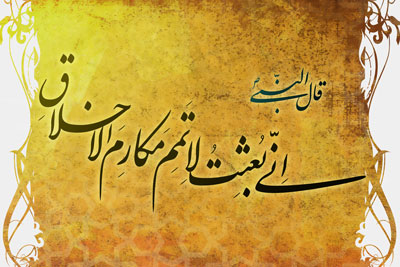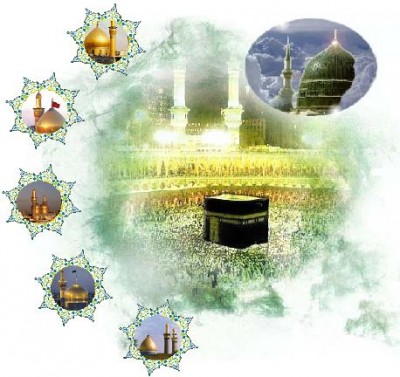
What Does Islam Say about Being Good-tempered?
A feature that is being propagated by different types of media about Muslims and Islam is an angry and aggressive face. This is while Islam has a lot of direct commands and recommendations about controlling anger and being good-tempered. A narration from Imam Sadiq (AS) defines good-temper very well: “Good temper is to soften your attitude and clear your speech and meet your brother with kindness.” [1]
In this text, we will study the viewpoint of





 Source: Ain-al-Hayat, By: Allama Muhammad Baqir Majlisi Authentic traditions indicate that striving to acquire wealth through fair means is legitimate and necessary. It is the duty of a person to make his best efforts and the success or failure is in the hands of Allah. One should always have his sights on, Assayee minni wa itmam min Allah. One who trusts on Allah, Allah is sufficient for him! If a person is not able to earn sufficiently after all the efforts, he should be contented with what
Source: Ain-al-Hayat, By: Allama Muhammad Baqir Majlisi Authentic traditions indicate that striving to acquire wealth through fair means is legitimate and necessary. It is the duty of a person to make his best efforts and the success or failure is in the hands of Allah. One should always have his sights on, Assayee minni wa itmam min Allah. One who trusts on Allah, Allah is sufficient for him! If a person is not able to earn sufficiently after all the efforts, he should be contented with what
 Source: Ain-al-Hayat, By: Allama Muhammad Baqir Majlisi A Mu’min is recognized by two essential traits—he has fear of Allah and hopes for His rewards in moderation. The Mu’min neither spends all his life in acute fear of Allah’s retribution, nor has he excessive hopes of rewards! One has to bear in mind that both these excesses are sins! Ruja means carrying hope of Allah’s Mercy. A person who expects ruja but continues with his sinful acts will be a hypocrite of the highest order.
Source: Ain-al-Hayat, By: Allama Muhammad Baqir Majlisi A Mu’min is recognized by two essential traits—he has fear of Allah and hopes for His rewards in moderation. The Mu’min neither spends all his life in acute fear of Allah’s retribution, nor has he excessive hopes of rewards! One has to bear in mind that both these excesses are sins! Ruja means carrying hope of Allah’s Mercy. A person who expects ruja but continues with his sinful acts will be a hypocrite of the highest order.
 Source: Ain-al-Hayat, By: Allama Muhammad Baqir Majlisi Muhammad Yakub Kulaini quotes from Imam Zain-ul-’Abidin (as) that some people were sailing in a boat when it toppled in a storm. Only one woman survived by hanging on to a wooden plank that kept afloat. She landed in an island where she met a sinful person. When he saw the woman the evil desires rose in his mind. The woman cried and begged him to spare her the ignominy. The man told her why she was so scared of anyone in that lonely place
Source: Ain-al-Hayat, By: Allama Muhammad Baqir Majlisi Muhammad Yakub Kulaini quotes from Imam Zain-ul-’Abidin (as) that some people were sailing in a boat when it toppled in a storm. Only one woman survived by hanging on to a wooden plank that kept afloat. She landed in an island where she met a sinful person. When he saw the woman the evil desires rose in his mind. The woman cried and begged him to spare her the ignominy. The man told her why she was so scared of anyone in that lonely place Source: Ain-al-Hayat, By: Allama Muhammad Baqir Majlisi The Prophet of Islam (S) has said that the first to enter the Heaven will be the faqirs or the impecunious persons. When they are admitted to the Heaven, people will wonder why they were allowed to enter without any questioning. Then the faqirs would say that they needed not to render any account that they were neither king nor had any high ranks in the world. They had no wealth to be responsible for apportioning it. They were busy in the
Source: Ain-al-Hayat, By: Allama Muhammad Baqir Majlisi The Prophet of Islam (S) has said that the first to enter the Heaven will be the faqirs or the impecunious persons. When they are admitted to the Heaven, people will wonder why they were allowed to enter without any questioning. Then the faqirs would say that they needed not to render any account that they were neither king nor had any high ranks in the world. They had no wealth to be responsible for apportioning it. They were busy in the \Source: Ain-al-Hayat, By: Allama Muhammad Baqir Majlisi Humility is the best of all the human traits. One should always bear in his mind that Greatness is all for Allah only. The more humble a person, the more he shall be endowed with the bounties of Allah. The earth in its humility is a repository of the jewels and other invaluable resources, it helps in the production of innumerable fruits and flowers. Similarly, man, who has been made from the humble soil, had the privilege of the angels
\Source: Ain-al-Hayat, By: Allama Muhammad Baqir Majlisi Humility is the best of all the human traits. One should always bear in his mind that Greatness is all for Allah only. The more humble a person, the more he shall be endowed with the bounties of Allah. The earth in its humility is a repository of the jewels and other invaluable resources, it helps in the production of innumerable fruits and flowers. Similarly, man, who has been made from the humble soil, had the privilege of the angels